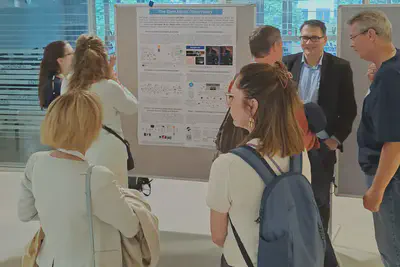Federating Music Library Data in Hungary – A Call to Action
A post about our IAML2025 presentation and an invitation for Hungarian data federation pilots
How can music library services be modernized to compete with platforms like Spotify, YouTube, or Apple Music Classical? How can we make it easy for music students, educators, amateurs, or professional musicians to find the sheet music of a piece that interests them? And how can schoolchildren explore the music of their town or region—with the help of local musicians, teachers, or librarians—given the limited financial resources of university and public libraries worldwide?
Our tools are open-source and free to test, and we are happy to support those interested in exploring them. We are also planning a meetup in Budapest at the end of August or beginning of September to discuss these ideas further with IAML Hungary members.
🇭🇺 Olvasd magyarul el ezt a bejegyzést - Hungarian version of this post.
Daniel Antal, co-founder of Reprex, originally presented at the IAML 2025 Congress alongside librarian Anna Mester and Anna Žilková, head of IAML Slovakia. Their presentation and poster explored the legal, organizational, and information science aspects of the data-sharing infrastructure behind the Slovak Comprehensive Music Database (SKCMDb). A year earlier, the Hungarian professional community encountered this work at the Networkshop 2024: Digital Transformation of Education, Research, and Public Collections conference, in the talk and paper titled A szlovák adatkicserélési tér magyarországi föderációjának lehetőségei [Opportunities for Federating the Slovak Data Exchange Space in Hungary].
At the IAML Congress, we invited international partners to test, critique, and help develop a live demo service. Thanks to Salzburg’s geographical and cultural proximity, we were joined by many Hungarian colleagues.

Our project’s ambitious goal is to make all music created within the territory of present-day Slovakia accessible through a semantic database. This includes a user-friendly graphical interface for individuals and API access for libraries and other institutions. The database connects known works and their variants, manuscript and published scores, and demo, archival, and commercial recordings. It also links composers and performers to secondary sources in libraries and archives that provide musicological context.
In Slovakia, we are integrating materials from the Music Fund, the Slovak Music Centre, and the SOZA database (sister organization to Artisjus). This enables us to substantially improve the data quality of public music library catalogues, which often lack detailed, work-level descriptions of scores. Metadata is frequently incomplete, outdated, or even incorrect. For example, a catalogue may refer to a composer’s “collected works” or “selected sonatas,” but rarely indicate which edition contains a particular sonata or movement a listener may have just encountered on a streaming playlist.
.](/media/posters/IAML-reprex-poster-2025_hu29650834c1f466e3d24bbd103225d8fb_3179691_01169f53faf069cb2891f0b0e3cd648a.webp)
Our Salzburg presentation explored key questions:
How does data governance work between private and public organizations—such as between a rights management society or streaming platform and a university or public library?
How can we reduce redundant workflows through data exchange?
How can deeper, semantically enriched search improve music library services?
What transferable insights from information and library science can help libraries, archives, museums, and private actors mutually improve their data?
The development of this system is supported by the European Union’s Horizon Europe programme, through the Open Music Europe project. Our aim is to offer a federated, decentralized alternative to the centralized but never built European Music Observatory model—one that builds on existing national, regional, and pan-European data systems in a networked way and leaves data ownership and control in place following the subsidiarity principle.
Our tools are open-source and free to test, and we are happy to support those interested in exploring them. We are also planning a meetup in Budapest at the end of August or beginning of September to discuss these ideas further with IAML Hungary members.
](/media/png/skcmdb/skcmdb-library-access_huf3155c55aaf98b7cdd63ae10eaa747e0_109899_44f93947517fcf22ddbe6ef033eed7cf.webp)
If you care about interoperability, cultural equity, and the future of library relevance in the streaming era—this is your moment to get involved.
Missed IAML2025?
👉 Presentation
👉 Poster
👉 Please contact us directly to try out our system.
👉 Blogpost about the wider context of our work, relevant for IAML, not only national chapters and invidivual members.